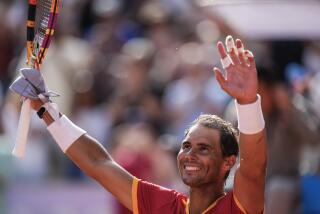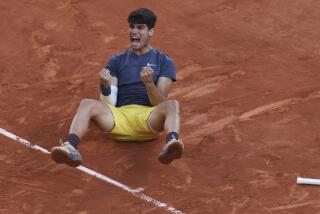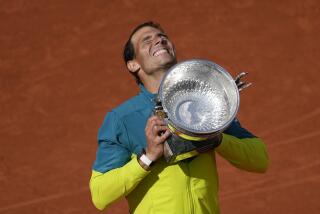Nadal defeats Federer for Australian Open title
MELBOURNE, AUSTRALIA — It’s time to move on from the Australian Open.
Even as Rafael Nadal spent two post-match hours tending to technicalities such as being drug tested and physicalities such as trying to get his right hamstring loosened up enough that he could walk without a limp, the questions were forming.
Is it possible the 22-year-old from Mallorca, with his crooked grin, snarling power and sweet-natured approach to his greatness, will himself one day challenge the record of most Grand Slam tournaments won (14) now held by Pete Sampras?
Roger Federer was positioned to tie that record Sunday night at Rod Laver Arena, but it didn’t happen. Federer, 27, instead was dripping sweat and tears, emotionally wrung out after his 7-5, 3-6, 7-6 (3), 3-6, 6-2 loss to the top-seeded Nadal on Sunday night.
And by the time Nadal met with the media, the questions were already formulated.
Is it Nadal who will threaten the Sampras record?
While Sampras won his sixth major title in his 25th attempt and Federer in his 26th, Nadal has six in only 20 Grand Slam tournaments. And Nadal is the second-youngest man to have won so many Slam titles. Bjorn Borg was 22 years 1 month old; Nadal is 22 years 7 months.
“I have six right now, no?” Nadal said. “I’m happy with my six. Well, for sure I’m going to continue my best every day to improve my tennis for trying to continue to win matches and titles.
“But I know it is very difficult, everything, no? Every title I know how tough is to win every one. When I won my first one I didn’t know if I was going to win more.”
What works so well for Nadal when he plays Federer, whom he leads 13-6 in career meetings -- his unbridled and unrelenting left-handed power and the grunting slices he can hit on full run -- could work against Nadal’s longevity.
He has already missed parts of seasons because of sore knees. He plays with wraps just below both kneecaps, something most people just noticed this year when Nike designed a new outfit for the Spaniard that included shorter shorts and sleeves on his shirt. But those wraps have been around for a while.
“His game style takes far more effort than either Federer’s or Sampras’,” said U.S. David Cup coach and ESPN commentator Patrick McEnroe.
“But Rafa is turning himself into one of the mentally toughest athletes in all of sport.”
Tennis Channel analyst and 18-time Grand Slam winner Martina Navratilova said that Nadal’s left-handed play makes Federer a tentative player, but she agreed that Nadal’s biggest challenge in trying to become one of the best ever is his style.
“It’s so physical,” Navratilova said. “Can he keep up the pace with all that effort? We’ve already seen him have injury issues and he’s only 22. Time will tell.”
Nadal’s advantage against Federer, Navratilova said, is that Nadal’s serve moves away from Federer’s classic one-handed backhand so that Federer doesn’t get to unleash his signature shot, a stroke that strikes quicker than a snake’s tongue, nothing more than a hiss and it’s gone.
Instead Nadal’s lefty angles keep Federer wrong-footed or running around trying to find position.
More notable than watching the fifth set turn into a runaway for Nadal, who some thought might be too tired after a record-setting 5 hour 14-minute, five-set semifinal victory over Fernando Verdasco that started Friday night and ended Saturday morning, was seeing Federer emotionally crack on the court during the award ceremony.
As Federer tried to thank the fans at Rod Laver Arena, he could only choke out a few words before he was overcome with choking sobs.
“God this hurts,” Federer said as he walked away from the microphone.
Given an extra hour, a chance to shower and compose himself, Federer was totally without emotion when he spoke to the media. He dismissed the idea that Nadal, who beat him in the finals of both the French Open and Wimbledon last season, is unsolvable for him.
“I didn’t spend four and a half hours out there not believing I can beat him,” Federer said.
But Nadal also has gained a belief that he is not merely a clay-court baseliner consigned to ringing up win after win on the slow red clay at the French Open but nowhere else.
“I’ve worked very hard, the last, well, all my life to improve the tennis outside of clay,” Nadal said.
Besides winning this title on a hard court, Nadal won an Olympic gold medal on Beijing’s hard courts and ended Federer’s grip on the grass courts of Wimbledon last July.
Suddenly the only major title he doesn’t have is the U.S. Open.
“I like to win that too,” Nadal said. “Someday. Why not?”
--
More to Read
Go beyond the scoreboard
Get the latest on L.A.'s teams in the daily Sports Report newsletter.
You may occasionally receive promotional content from the Los Angeles Times.










